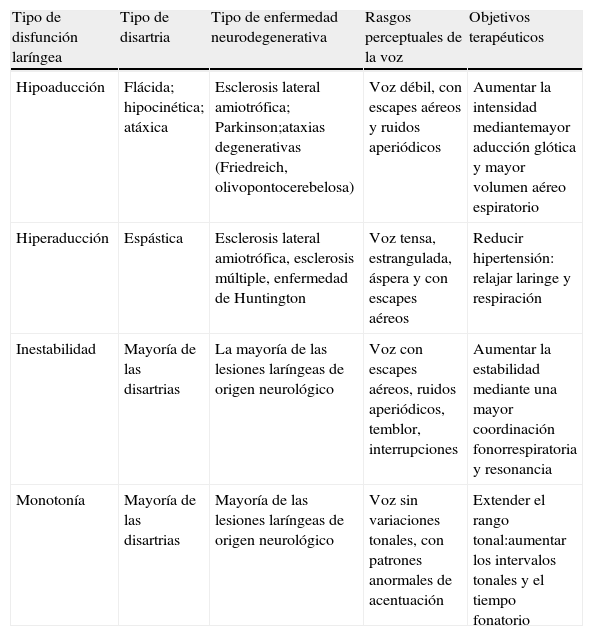El tratamiento de los trastornos de la voz en las enfermedades neurodegenerativas es un tema muy controvertido, ya que no es posible esperar ni que la función se recupere totalmente, ni que las mejorías derivadas del tratamiento se mantengan a largo plazo. Es por ello que programar el tratamiento de la voz en estos trastornos implica replantearse el concepto de eficacia, ya que en estas personas no es posible conseguir logros permanentes. Sin embargo, actualmente existen estudios que demuestran resultados funcionales que permiten mantener por más tiempo una mejor calidad de vida. En este trabajo se ha revisado el estado actual de la literatura sobre el concepto de eficacia en el tratamiento de los problemas vocales de las enfermedades neurodegenerativas, analizando una serie de factores que favorecen esta eficacia y propician una mayor y más permanente disminución de la limitación funcional. Entre los factores propuestos cabe señalar la precocidad en la intervención, la jerarquización sistemática de objetivos terapéuticos y la diversificación de recursos. Asimismo se han seleccionado los protocolos de intervención para paliar los 3 tipos de déficits fonorrespiratorios más comunes en este tipo de enfermedades, esto es: la insuficiencia fonorrespiratoria, la incoordinación fonorrespiratoria y las disfunciones laríngeas. La eficacia de las tareas propuestas ha sido avalada en la literatura, bien por la medicina basada en la evidencia, bien por la opinión de expertos.
Treating voice problems in neurodegenerative diseases is a controversial topic due to the lack of expectations of achieving complete functional recovery or long-lasting improvement. Therefore, when planning voice therapy in these disorders, the concept of efficacy needs to be redefined, since permanent improvements cannot be achieved in these patients. However, studies have been published that show more permanent functional benefits and improvements in quality of life of these persons. The present study was designed to review the state of the art on the vocal therapy of neurodegenerative diseases and to analyze the factors that enhance treatment efficacy and favor greater and longer-lasting reduction of functional limitations. Among the proposed factors to increase treatment efficacy are starting the intervention in the initial phases of the disorder, systematically planning the hierarchy of therapeutic targets, and implementing a multidimensional approach to different types of treatment resources. Additionally, a series of therapeutic protocols were selected to address the three main phonation deficits in neurodegenerative diseases, i.e. respiratory insufficiency, phonation incoordination and laryngeal dysfunction. All of the therapeutic strategies proposed in this study have been documented as being target efficient by either scientific evidence or expert opinion.
Artículo
Comprando el artículo el PDF del mismo podrá ser descargado
Precio 19,34 €
Comprar ahora








